Taxation Law Report for ACC301: Business Sale Tax Implications
VerifiedAdded on 2023/01/17
|10
|3062
|41
Report
AI Summary
This report provides an in-depth analysis of Australian taxation law, particularly focusing on the tax implications arising from the sale of a car sales business by Mr. Ben. The report, structured using the ILAC format (Issue, Laws, Application, Conclusion), addresses the relevant laws including the Australian Contract Act, GST, Capital Gains Tax (CGT), and small business concessions. It examines the application of these laws to the specific case, detailing the tax treatment of various components of the sale, such as the car yard site, cars in hand, office equipment, and goodwill. The report also considers the implications of a non-compete agreement and the available tax concessions to minimize tax liabilities. Furthermore, it references the Income Tax Assessment Act, 1997 (ITAA 1997) and a relevant case law, Commissioner of Taxation vs Devuba Pty Ltd, to support its arguments. The report provides a clear understanding of how the sale of a business is taxed and the importance of proper planning to reduce tax burdens.
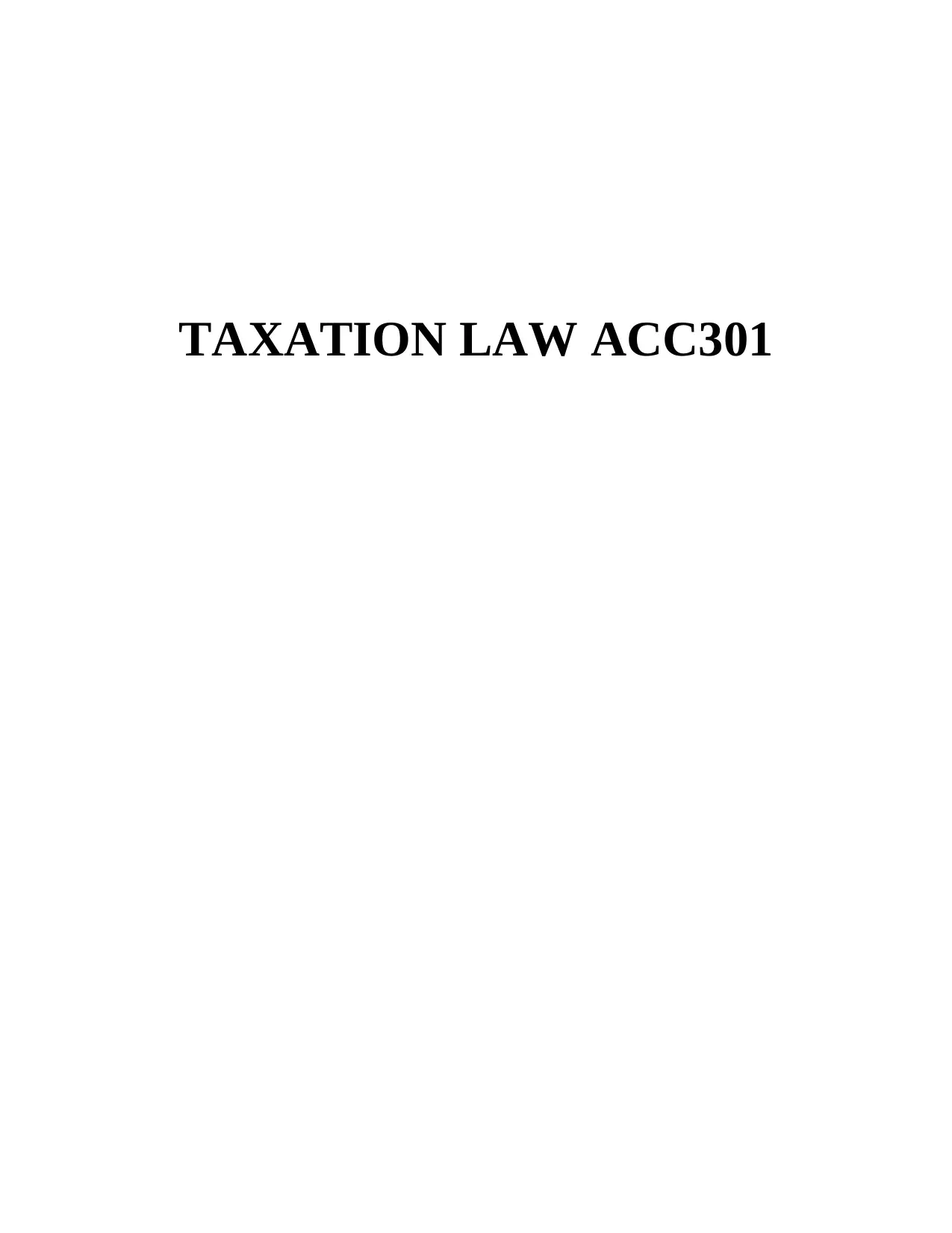
TAXATION LAW ACC301
Paraphrase This Document
Need a fresh take? Get an instant paraphrase of this document with our AI Paraphraser
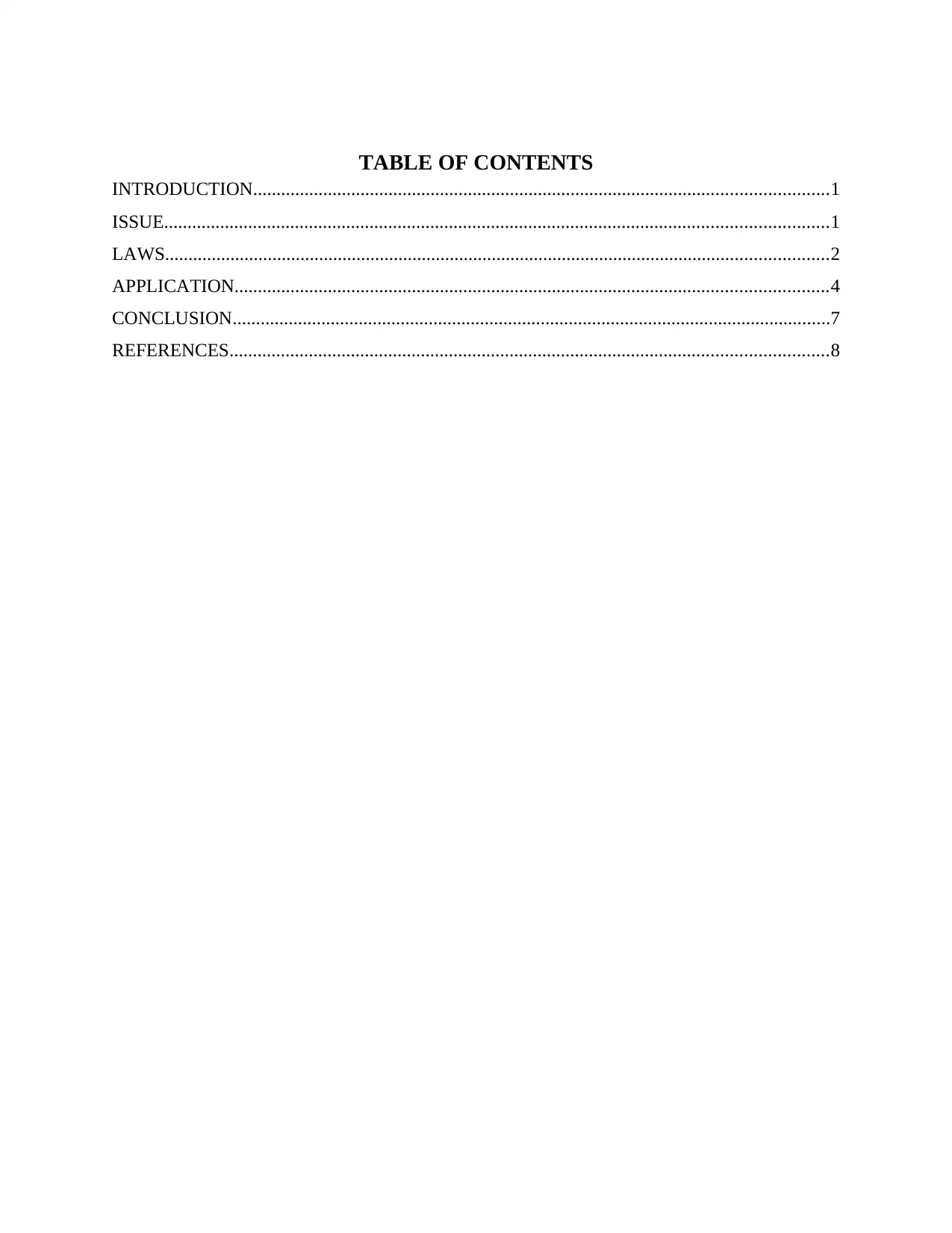
TABLE OF CONTENTS
INTRODUCTION...........................................................................................................................1
ISSUE..............................................................................................................................................1
LAWS..............................................................................................................................................2
APPLICATION...............................................................................................................................4
CONCLUSION................................................................................................................................7
REFERENCES................................................................................................................................8
INTRODUCTION...........................................................................................................................1
ISSUE..............................................................................................................................................1
LAWS..............................................................................................................................................2
APPLICATION...............................................................................................................................4
CONCLUSION................................................................................................................................7
REFERENCES................................................................................................................................8
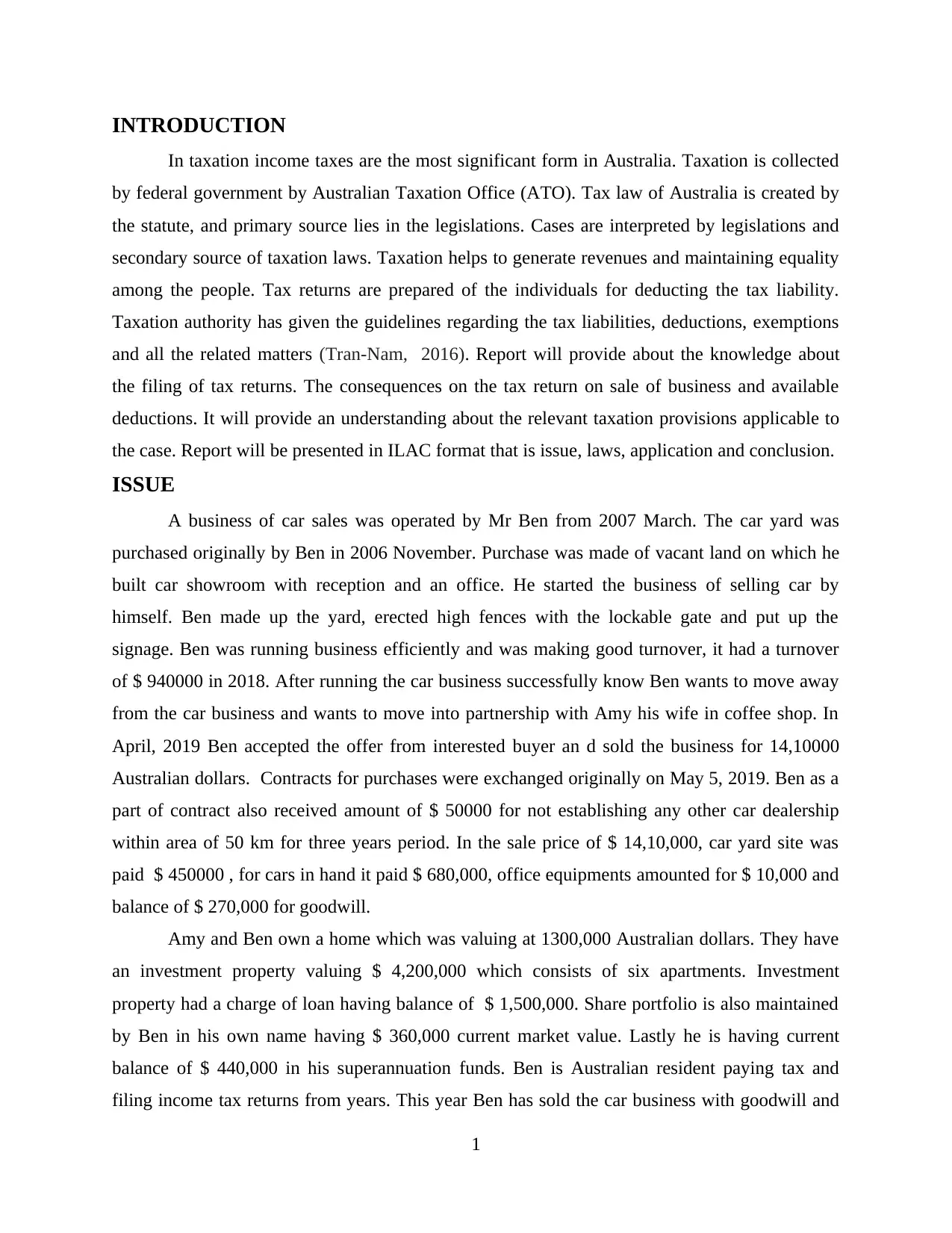
INTRODUCTION
In taxation income taxes are the most significant form in Australia. Taxation is collected
by federal government by Australian Taxation Office (ATO). Tax law of Australia is created by
the statute, and primary source lies in the legislations. Cases are interpreted by legislations and
secondary source of taxation laws. Taxation helps to generate revenues and maintaining equality
among the people. Tax returns are prepared of the individuals for deducting the tax liability.
Taxation authority has given the guidelines regarding the tax liabilities, deductions, exemptions
and all the related matters (Tran-Nam, 2016). Report will provide about the knowledge about
the filing of tax returns. The consequences on the tax return on sale of business and available
deductions. It will provide an understanding about the relevant taxation provisions applicable to
the case. Report will be presented in ILAC format that is issue, laws, application and conclusion.
ISSUE
A business of car sales was operated by Mr Ben from 2007 March. The car yard was
purchased originally by Ben in 2006 November. Purchase was made of vacant land on which he
built car showroom with reception and an office. He started the business of selling car by
himself. Ben made up the yard, erected high fences with the lockable gate and put up the
signage. Ben was running business efficiently and was making good turnover, it had a turnover
of $ 940000 in 2018. After running the car business successfully know Ben wants to move away
from the car business and wants to move into partnership with Amy his wife in coffee shop. In
April, 2019 Ben accepted the offer from interested buyer an d sold the business for 14,10000
Australian dollars. Contracts for purchases were exchanged originally on May 5, 2019. Ben as a
part of contract also received amount of $ 50000 for not establishing any other car dealership
within area of 50 km for three years period. In the sale price of $ 14,10,000, car yard site was
paid $ 450000 , for cars in hand it paid $ 680,000, office equipments amounted for $ 10,000 and
balance of $ 270,000 for goodwill.
Amy and Ben own a home which was valuing at 1300,000 Australian dollars. They have
an investment property valuing $ 4,200,000 which consists of six apartments. Investment
property had a charge of loan having balance of $ 1,500,000. Share portfolio is also maintained
by Ben in his own name having $ 360,000 current market value. Lastly he is having current
balance of $ 440,000 in his superannuation funds. Ben is Australian resident paying tax and
filing income tax returns from years. This year Ben has sold the car business with goodwill and
1
In taxation income taxes are the most significant form in Australia. Taxation is collected
by federal government by Australian Taxation Office (ATO). Tax law of Australia is created by
the statute, and primary source lies in the legislations. Cases are interpreted by legislations and
secondary source of taxation laws. Taxation helps to generate revenues and maintaining equality
among the people. Tax returns are prepared of the individuals for deducting the tax liability.
Taxation authority has given the guidelines regarding the tax liabilities, deductions, exemptions
and all the related matters (Tran-Nam, 2016). Report will provide about the knowledge about
the filing of tax returns. The consequences on the tax return on sale of business and available
deductions. It will provide an understanding about the relevant taxation provisions applicable to
the case. Report will be presented in ILAC format that is issue, laws, application and conclusion.
ISSUE
A business of car sales was operated by Mr Ben from 2007 March. The car yard was
purchased originally by Ben in 2006 November. Purchase was made of vacant land on which he
built car showroom with reception and an office. He started the business of selling car by
himself. Ben made up the yard, erected high fences with the lockable gate and put up the
signage. Ben was running business efficiently and was making good turnover, it had a turnover
of $ 940000 in 2018. After running the car business successfully know Ben wants to move away
from the car business and wants to move into partnership with Amy his wife in coffee shop. In
April, 2019 Ben accepted the offer from interested buyer an d sold the business for 14,10000
Australian dollars. Contracts for purchases were exchanged originally on May 5, 2019. Ben as a
part of contract also received amount of $ 50000 for not establishing any other car dealership
within area of 50 km for three years period. In the sale price of $ 14,10,000, car yard site was
paid $ 450000 , for cars in hand it paid $ 680,000, office equipments amounted for $ 10,000 and
balance of $ 270,000 for goodwill.
Amy and Ben own a home which was valuing at 1300,000 Australian dollars. They have
an investment property valuing $ 4,200,000 which consists of six apartments. Investment
property had a charge of loan having balance of $ 1,500,000. Share portfolio is also maintained
by Ben in his own name having $ 360,000 current market value. Lastly he is having current
balance of $ 440,000 in his superannuation funds. Ben is Australian resident paying tax and
filing income tax returns from years. This year Ben has sold the car business with goodwill and
1
⊘ This is a preview!⊘
Do you want full access?
Subscribe today to unlock all pages.

Trusted by 1+ million students worldwide
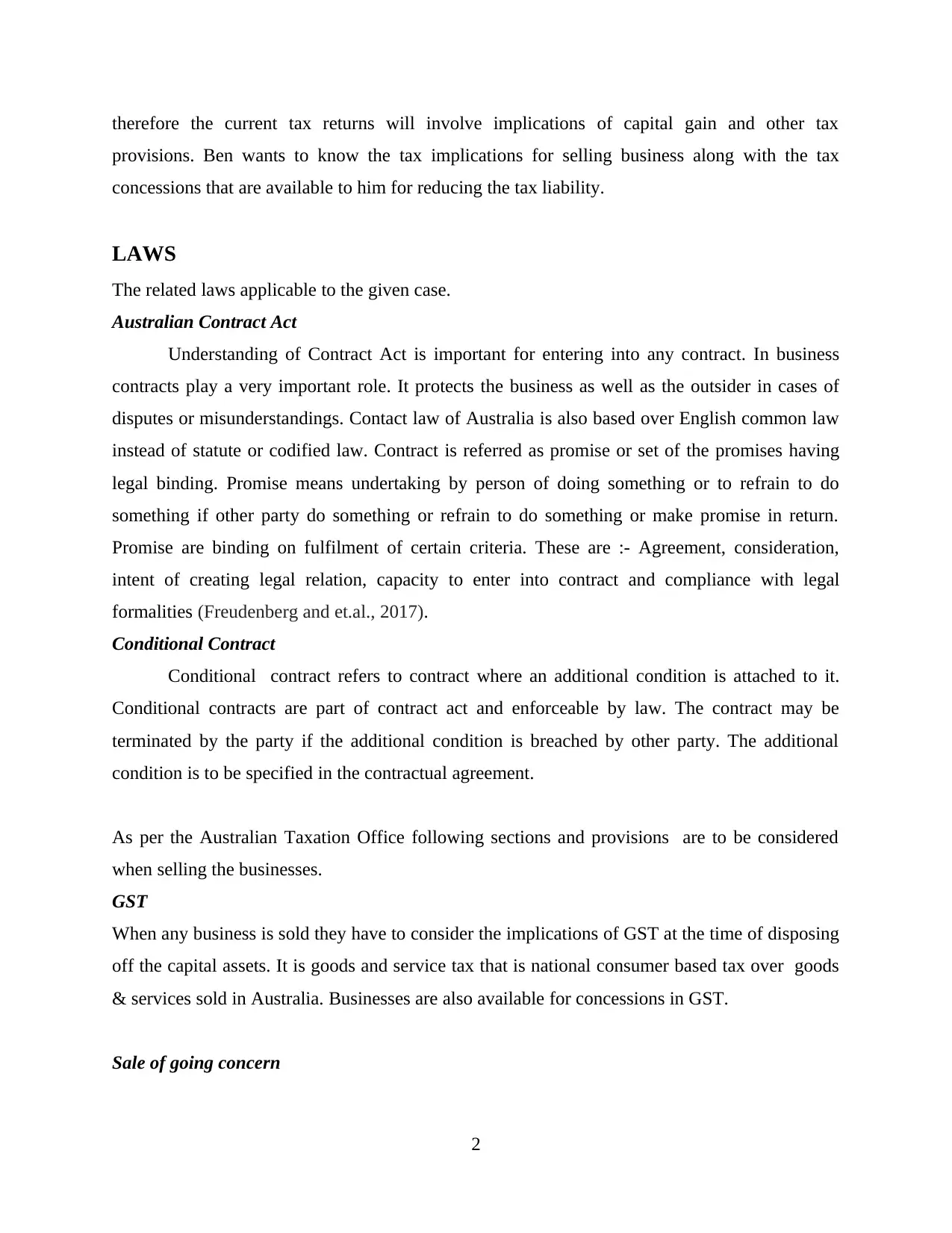
therefore the current tax returns will involve implications of capital gain and other tax
provisions. Ben wants to know the tax implications for selling business along with the tax
concessions that are available to him for reducing the tax liability.
LAWS
The related laws applicable to the given case.
Australian Contract Act
Understanding of Contract Act is important for entering into any contract. In business
contracts play a very important role. It protects the business as well as the outsider in cases of
disputes or misunderstandings. Contact law of Australia is also based over English common law
instead of statute or codified law. Contract is referred as promise or set of the promises having
legal binding. Promise means undertaking by person of doing something or to refrain to do
something if other party do something or refrain to do something or make promise in return.
Promise are binding on fulfilment of certain criteria. These are :- Agreement, consideration,
intent of creating legal relation, capacity to enter into contract and compliance with legal
formalities (Freudenberg and et.al., 2017).
Conditional Contract
Conditional contract refers to contract where an additional condition is attached to it.
Conditional contracts are part of contract act and enforceable by law. The contract may be
terminated by the party if the additional condition is breached by other party. The additional
condition is to be specified in the contractual agreement.
As per the Australian Taxation Office following sections and provisions are to be considered
when selling the businesses.
GST
When any business is sold they have to consider the implications of GST at the time of disposing
off the capital assets. It is goods and service tax that is national consumer based tax over goods
& services sold in Australia. Businesses are also available for concessions in GST.
Sale of going concern
2
provisions. Ben wants to know the tax implications for selling business along with the tax
concessions that are available to him for reducing the tax liability.
LAWS
The related laws applicable to the given case.
Australian Contract Act
Understanding of Contract Act is important for entering into any contract. In business
contracts play a very important role. It protects the business as well as the outsider in cases of
disputes or misunderstandings. Contact law of Australia is also based over English common law
instead of statute or codified law. Contract is referred as promise or set of the promises having
legal binding. Promise means undertaking by person of doing something or to refrain to do
something if other party do something or refrain to do something or make promise in return.
Promise are binding on fulfilment of certain criteria. These are :- Agreement, consideration,
intent of creating legal relation, capacity to enter into contract and compliance with legal
formalities (Freudenberg and et.al., 2017).
Conditional Contract
Conditional contract refers to contract where an additional condition is attached to it.
Conditional contracts are part of contract act and enforceable by law. The contract may be
terminated by the party if the additional condition is breached by other party. The additional
condition is to be specified in the contractual agreement.
As per the Australian Taxation Office following sections and provisions are to be considered
when selling the businesses.
GST
When any business is sold they have to consider the implications of GST at the time of disposing
off the capital assets. It is goods and service tax that is national consumer based tax over goods
& services sold in Australia. Businesses are also available for concessions in GST.
Sale of going concern
2
Paraphrase This Document
Need a fresh take? Get an instant paraphrase of this document with our AI Paraphraser
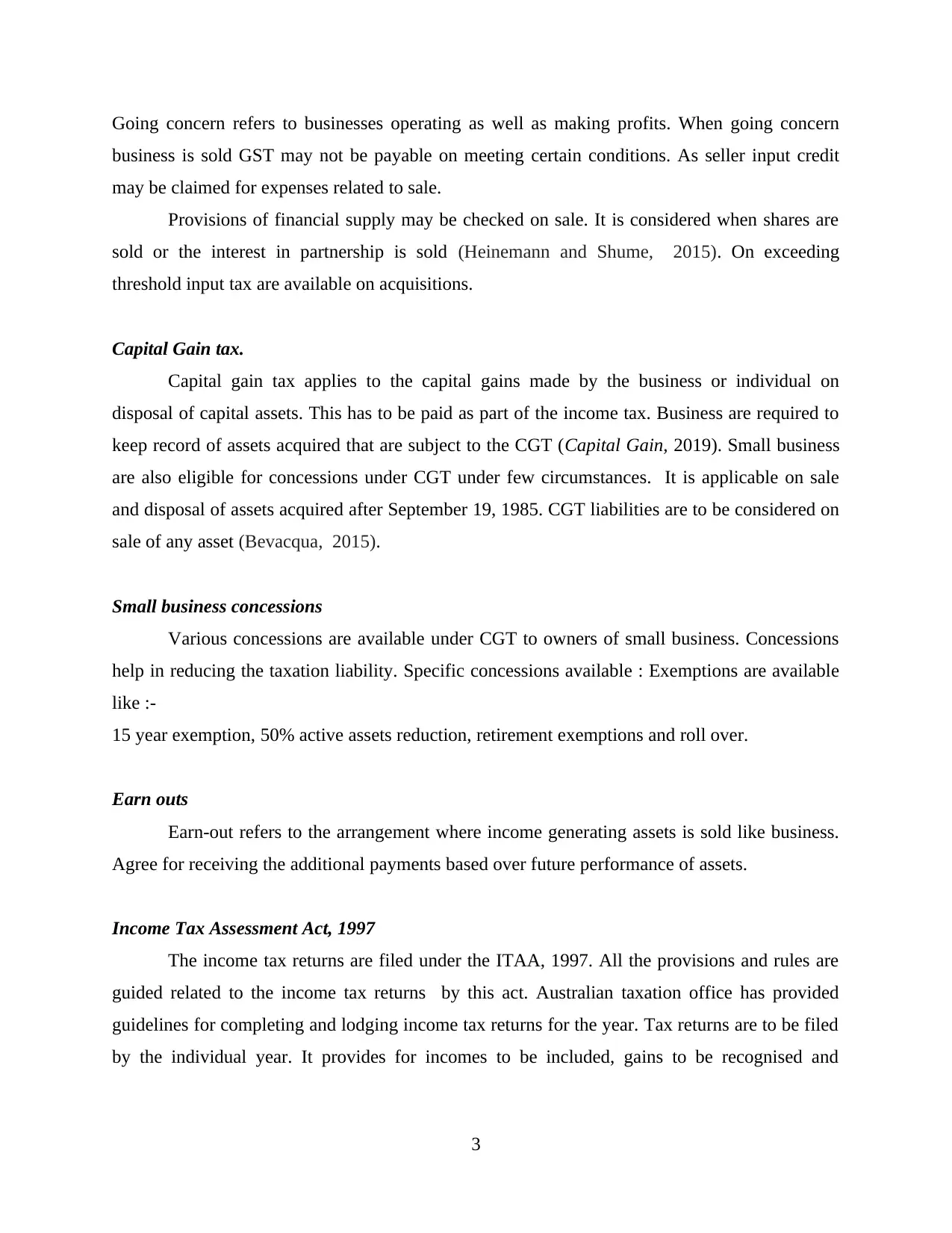
Going concern refers to businesses operating as well as making profits. When going concern
business is sold GST may not be payable on meeting certain conditions. As seller input credit
may be claimed for expenses related to sale.
Provisions of financial supply may be checked on sale. It is considered when shares are
sold or the interest in partnership is sold (Heinemann and Shume, 2015). On exceeding
threshold input tax are available on acquisitions.
Capital Gain tax.
Capital gain tax applies to the capital gains made by the business or individual on
disposal of capital assets. This has to be paid as part of the income tax. Business are required to
keep record of assets acquired that are subject to the CGT (Capital Gain, 2019). Small business
are also eligible for concessions under CGT under few circumstances. It is applicable on sale
and disposal of assets acquired after September 19, 1985. CGT liabilities are to be considered on
sale of any asset (Bevacqua, 2015).
Small business concessions
Various concessions are available under CGT to owners of small business. Concessions
help in reducing the taxation liability. Specific concessions available : Exemptions are available
like :-
15 year exemption, 50% active assets reduction, retirement exemptions and roll over.
Earn outs
Earn-out refers to the arrangement where income generating assets is sold like business.
Agree for receiving the additional payments based over future performance of assets.
Income Tax Assessment Act, 1997
The income tax returns are filed under the ITAA, 1997. All the provisions and rules are
guided related to the income tax returns by this act. Australian taxation office has provided
guidelines for completing and lodging income tax returns for the year. Tax returns are to be filed
by the individual year. It provides for incomes to be included, gains to be recognised and
3
business is sold GST may not be payable on meeting certain conditions. As seller input credit
may be claimed for expenses related to sale.
Provisions of financial supply may be checked on sale. It is considered when shares are
sold or the interest in partnership is sold (Heinemann and Shume, 2015). On exceeding
threshold input tax are available on acquisitions.
Capital Gain tax.
Capital gain tax applies to the capital gains made by the business or individual on
disposal of capital assets. This has to be paid as part of the income tax. Business are required to
keep record of assets acquired that are subject to the CGT (Capital Gain, 2019). Small business
are also eligible for concessions under CGT under few circumstances. It is applicable on sale
and disposal of assets acquired after September 19, 1985. CGT liabilities are to be considered on
sale of any asset (Bevacqua, 2015).
Small business concessions
Various concessions are available under CGT to owners of small business. Concessions
help in reducing the taxation liability. Specific concessions available : Exemptions are available
like :-
15 year exemption, 50% active assets reduction, retirement exemptions and roll over.
Earn outs
Earn-out refers to the arrangement where income generating assets is sold like business.
Agree for receiving the additional payments based over future performance of assets.
Income Tax Assessment Act, 1997
The income tax returns are filed under the ITAA, 1997. All the provisions and rules are
guided related to the income tax returns by this act. Australian taxation office has provided
guidelines for completing and lodging income tax returns for the year. Tax returns are to be filed
by the individual year. It provides for incomes to be included, gains to be recognised and
3
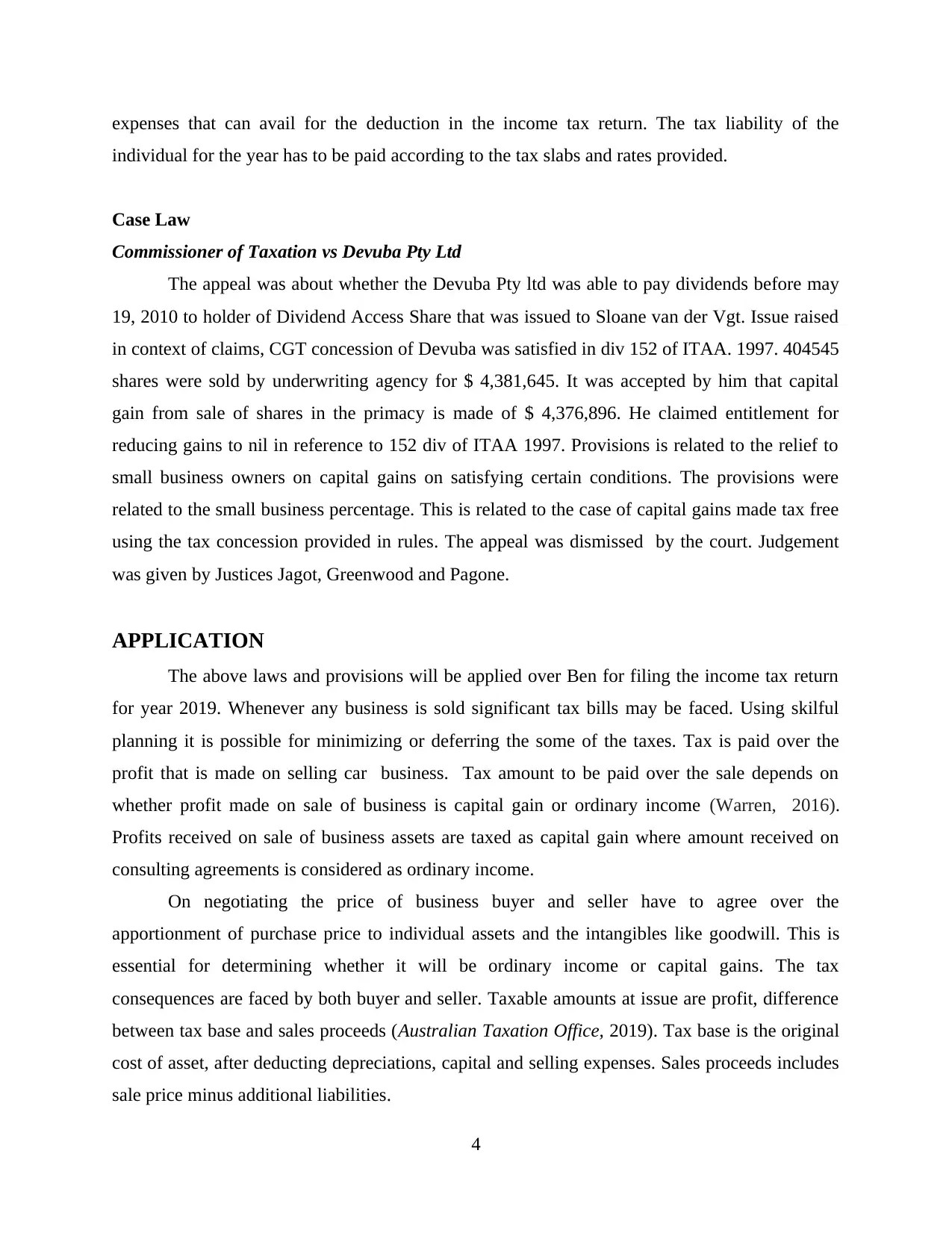
expenses that can avail for the deduction in the income tax return. The tax liability of the
individual for the year has to be paid according to the tax slabs and rates provided.
Case Law
Commissioner of Taxation vs Devuba Pty Ltd
The appeal was about whether the Devuba Pty ltd was able to pay dividends before may
19, 2010 to holder of Dividend Access Share that was issued to Sloane van der Vgt. Issue raised
in context of claims, CGT concession of Devuba was satisfied in div 152 of ITAA. 1997. 404545
shares were sold by underwriting agency for $ 4,381,645. It was accepted by him that capital
gain from sale of shares in the primacy is made of $ 4,376,896. He claimed entitlement for
reducing gains to nil in reference to 152 div of ITAA 1997. Provisions is related to the relief to
small business owners on capital gains on satisfying certain conditions. The provisions were
related to the small business percentage. This is related to the case of capital gains made tax free
using the tax concession provided in rules. The appeal was dismissed by the court. Judgement
was given by Justices Jagot, Greenwood and Pagone.
APPLICATION
The above laws and provisions will be applied over Ben for filing the income tax return
for year 2019. Whenever any business is sold significant tax bills may be faced. Using skilful
planning it is possible for minimizing or deferring the some of the taxes. Tax is paid over the
profit that is made on selling car business. Tax amount to be paid over the sale depends on
whether profit made on sale of business is capital gain or ordinary income (Warren, 2016).
Profits received on sale of business assets are taxed as capital gain where amount received on
consulting agreements is considered as ordinary income.
On negotiating the price of business buyer and seller have to agree over the
apportionment of purchase price to individual assets and the intangibles like goodwill. This is
essential for determining whether it will be ordinary income or capital gains. The tax
consequences are faced by both buyer and seller. Taxable amounts at issue are profit, difference
between tax base and sales proceeds (Australian Taxation Office, 2019). Tax base is the original
cost of asset, after deducting depreciations, capital and selling expenses. Sales proceeds includes
sale price minus additional liabilities.
4
individual for the year has to be paid according to the tax slabs and rates provided.
Case Law
Commissioner of Taxation vs Devuba Pty Ltd
The appeal was about whether the Devuba Pty ltd was able to pay dividends before may
19, 2010 to holder of Dividend Access Share that was issued to Sloane van der Vgt. Issue raised
in context of claims, CGT concession of Devuba was satisfied in div 152 of ITAA. 1997. 404545
shares were sold by underwriting agency for $ 4,381,645. It was accepted by him that capital
gain from sale of shares in the primacy is made of $ 4,376,896. He claimed entitlement for
reducing gains to nil in reference to 152 div of ITAA 1997. Provisions is related to the relief to
small business owners on capital gains on satisfying certain conditions. The provisions were
related to the small business percentage. This is related to the case of capital gains made tax free
using the tax concession provided in rules. The appeal was dismissed by the court. Judgement
was given by Justices Jagot, Greenwood and Pagone.
APPLICATION
The above laws and provisions will be applied over Ben for filing the income tax return
for year 2019. Whenever any business is sold significant tax bills may be faced. Using skilful
planning it is possible for minimizing or deferring the some of the taxes. Tax is paid over the
profit that is made on selling car business. Tax amount to be paid over the sale depends on
whether profit made on sale of business is capital gain or ordinary income (Warren, 2016).
Profits received on sale of business assets are taxed as capital gain where amount received on
consulting agreements is considered as ordinary income.
On negotiating the price of business buyer and seller have to agree over the
apportionment of purchase price to individual assets and the intangibles like goodwill. This is
essential for determining whether it will be ordinary income or capital gains. The tax
consequences are faced by both buyer and seller. Taxable amounts at issue are profit, difference
between tax base and sales proceeds (Australian Taxation Office, 2019). Tax base is the original
cost of asset, after deducting depreciations, capital and selling expenses. Sales proceeds includes
sale price minus additional liabilities.
4
⊘ This is a preview!⊘
Do you want full access?
Subscribe today to unlock all pages.

Trusted by 1+ million students worldwide
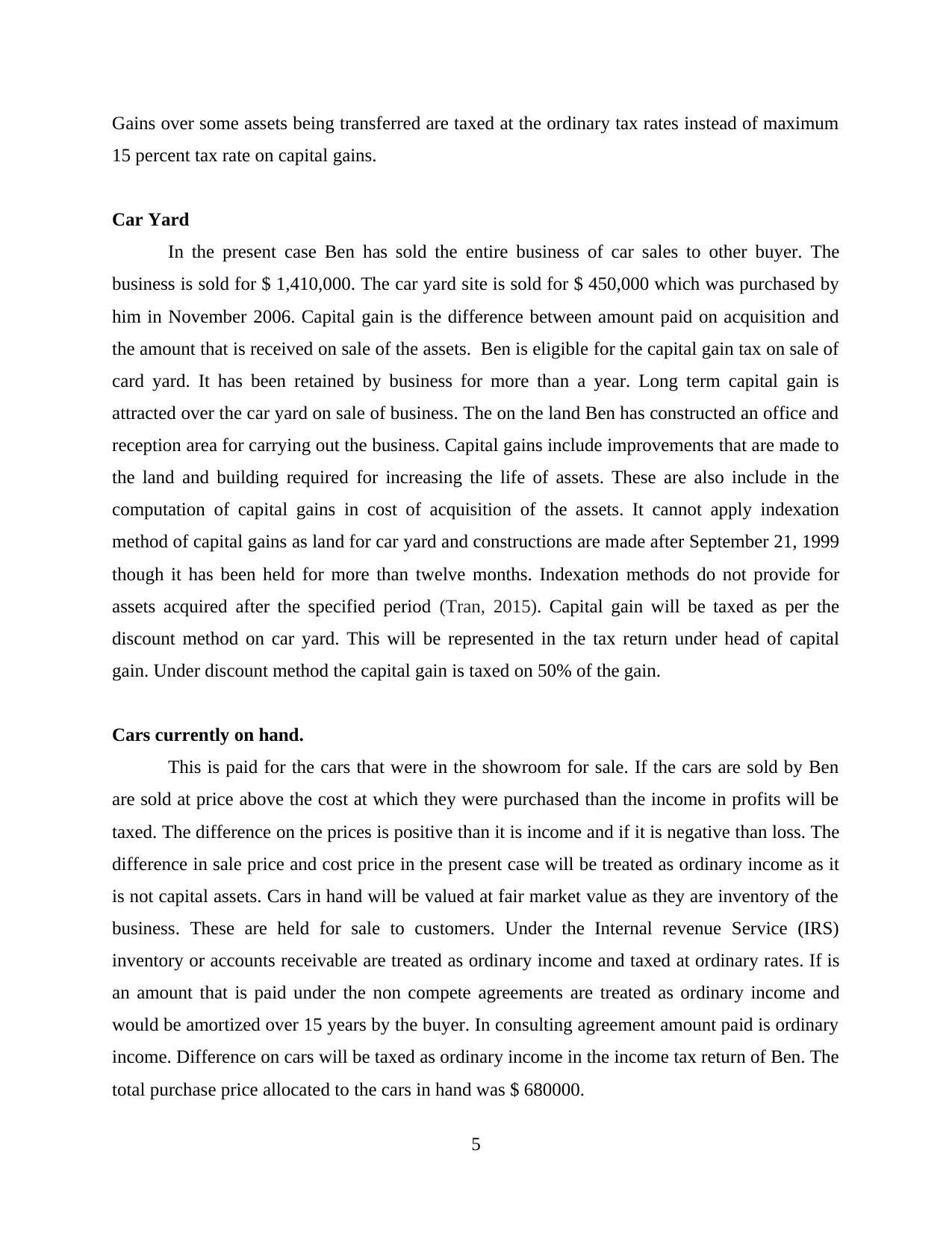
Gains over some assets being transferred are taxed at the ordinary tax rates instead of maximum
15 percent tax rate on capital gains.
Car Yard
In the present case Ben has sold the entire business of car sales to other buyer. The
business is sold for $ 1,410,000. The car yard site is sold for $ 450,000 which was purchased by
him in November 2006. Capital gain is the difference between amount paid on acquisition and
the amount that is received on sale of the assets. Ben is eligible for the capital gain tax on sale of
card yard. It has been retained by business for more than a year. Long term capital gain is
attracted over the car yard on sale of business. The on the land Ben has constructed an office and
reception area for carrying out the business. Capital gains include improvements that are made to
the land and building required for increasing the life of assets. These are also include in the
computation of capital gains in cost of acquisition of the assets. It cannot apply indexation
method of capital gains as land for car yard and constructions are made after September 21, 1999
though it has been held for more than twelve months. Indexation methods do not provide for
assets acquired after the specified period (Tran, 2015). Capital gain will be taxed as per the
discount method on car yard. This will be represented in the tax return under head of capital
gain. Under discount method the capital gain is taxed on 50% of the gain.
Cars currently on hand.
This is paid for the cars that were in the showroom for sale. If the cars are sold by Ben
are sold at price above the cost at which they were purchased than the income in profits will be
taxed. The difference on the prices is positive than it is income and if it is negative than loss. The
difference in sale price and cost price in the present case will be treated as ordinary income as it
is not capital assets. Cars in hand will be valued at fair market value as they are inventory of the
business. These are held for sale to customers. Under the Internal revenue Service (IRS)
inventory or accounts receivable are treated as ordinary income and taxed at ordinary rates. If is
an amount that is paid under the non compete agreements are treated as ordinary income and
would be amortized over 15 years by the buyer. In consulting agreement amount paid is ordinary
income. Difference on cars will be taxed as ordinary income in the income tax return of Ben. The
total purchase price allocated to the cars in hand was $ 680000.
5
15 percent tax rate on capital gains.
Car Yard
In the present case Ben has sold the entire business of car sales to other buyer. The
business is sold for $ 1,410,000. The car yard site is sold for $ 450,000 which was purchased by
him in November 2006. Capital gain is the difference between amount paid on acquisition and
the amount that is received on sale of the assets. Ben is eligible for the capital gain tax on sale of
card yard. It has been retained by business for more than a year. Long term capital gain is
attracted over the car yard on sale of business. The on the land Ben has constructed an office and
reception area for carrying out the business. Capital gains include improvements that are made to
the land and building required for increasing the life of assets. These are also include in the
computation of capital gains in cost of acquisition of the assets. It cannot apply indexation
method of capital gains as land for car yard and constructions are made after September 21, 1999
though it has been held for more than twelve months. Indexation methods do not provide for
assets acquired after the specified period (Tran, 2015). Capital gain will be taxed as per the
discount method on car yard. This will be represented in the tax return under head of capital
gain. Under discount method the capital gain is taxed on 50% of the gain.
Cars currently on hand.
This is paid for the cars that were in the showroom for sale. If the cars are sold by Ben
are sold at price above the cost at which they were purchased than the income in profits will be
taxed. The difference on the prices is positive than it is income and if it is negative than loss. The
difference in sale price and cost price in the present case will be treated as ordinary income as it
is not capital assets. Cars in hand will be valued at fair market value as they are inventory of the
business. These are held for sale to customers. Under the Internal revenue Service (IRS)
inventory or accounts receivable are treated as ordinary income and taxed at ordinary rates. If is
an amount that is paid under the non compete agreements are treated as ordinary income and
would be amortized over 15 years by the buyer. In consulting agreement amount paid is ordinary
income. Difference on cars will be taxed as ordinary income in the income tax return of Ben. The
total purchase price allocated to the cars in hand was $ 680000.
5
Paraphrase This Document
Need a fresh take? Get an instant paraphrase of this document with our AI Paraphraser
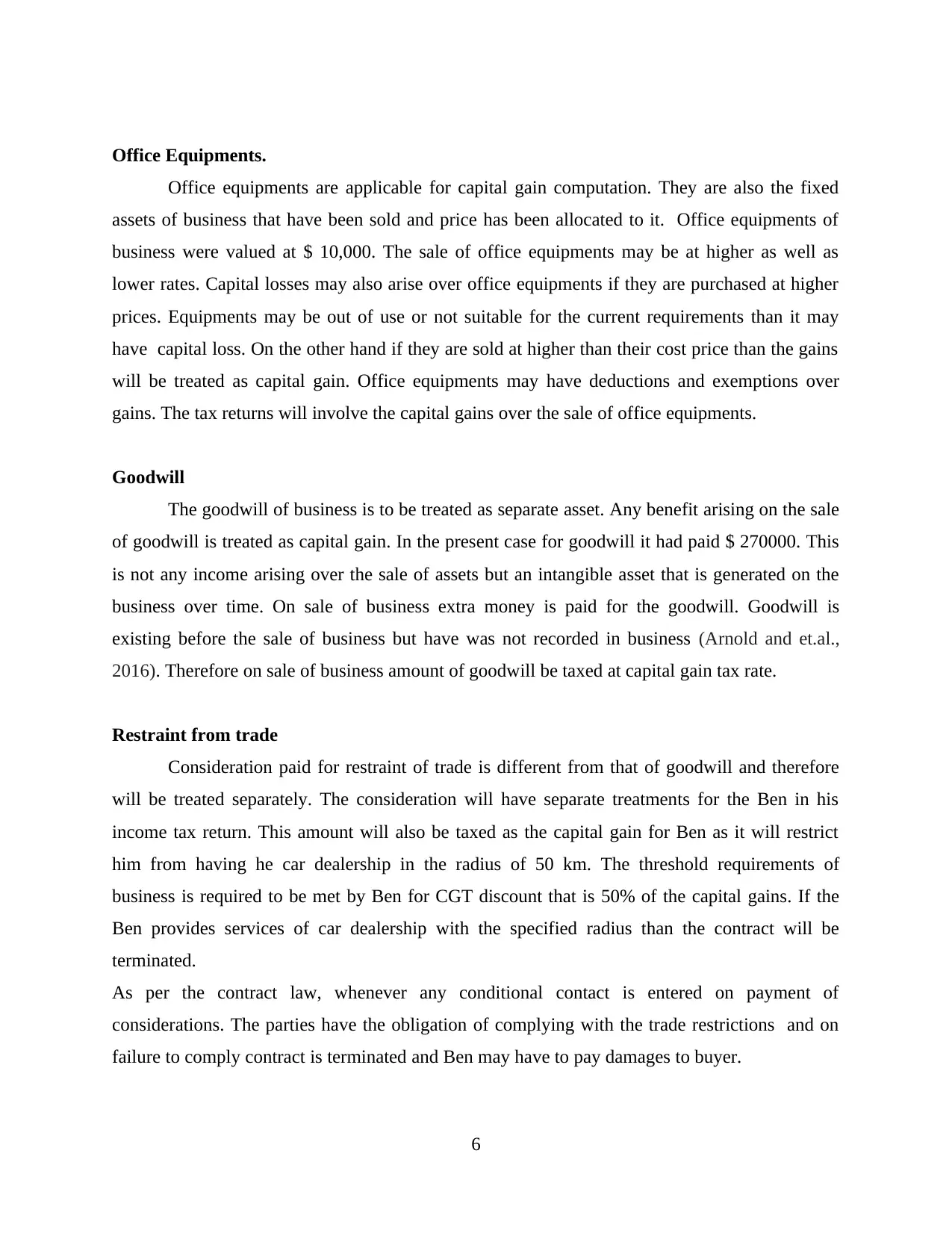
Office Equipments.
Office equipments are applicable for capital gain computation. They are also the fixed
assets of business that have been sold and price has been allocated to it. Office equipments of
business were valued at $ 10,000. The sale of office equipments may be at higher as well as
lower rates. Capital losses may also arise over office equipments if they are purchased at higher
prices. Equipments may be out of use or not suitable for the current requirements than it may
have capital loss. On the other hand if they are sold at higher than their cost price than the gains
will be treated as capital gain. Office equipments may have deductions and exemptions over
gains. The tax returns will involve the capital gains over the sale of office equipments.
Goodwill
The goodwill of business is to be treated as separate asset. Any benefit arising on the sale
of goodwill is treated as capital gain. In the present case for goodwill it had paid $ 270000. This
is not any income arising over the sale of assets but an intangible asset that is generated on the
business over time. On sale of business extra money is paid for the goodwill. Goodwill is
existing before the sale of business but have was not recorded in business (Arnold and et.al.,
2016). Therefore on sale of business amount of goodwill be taxed at capital gain tax rate.
Restraint from trade
Consideration paid for restraint of trade is different from that of goodwill and therefore
will be treated separately. The consideration will have separate treatments for the Ben in his
income tax return. This amount will also be taxed as the capital gain for Ben as it will restrict
him from having he car dealership in the radius of 50 km. The threshold requirements of
business is required to be met by Ben for CGT discount that is 50% of the capital gains. If the
Ben provides services of car dealership with the specified radius than the contract will be
terminated.
As per the contract law, whenever any conditional contact is entered on payment of
considerations. The parties have the obligation of complying with the trade restrictions and on
failure to comply contract is terminated and Ben may have to pay damages to buyer.
6
Office equipments are applicable for capital gain computation. They are also the fixed
assets of business that have been sold and price has been allocated to it. Office equipments of
business were valued at $ 10,000. The sale of office equipments may be at higher as well as
lower rates. Capital losses may also arise over office equipments if they are purchased at higher
prices. Equipments may be out of use or not suitable for the current requirements than it may
have capital loss. On the other hand if they are sold at higher than their cost price than the gains
will be treated as capital gain. Office equipments may have deductions and exemptions over
gains. The tax returns will involve the capital gains over the sale of office equipments.
Goodwill
The goodwill of business is to be treated as separate asset. Any benefit arising on the sale
of goodwill is treated as capital gain. In the present case for goodwill it had paid $ 270000. This
is not any income arising over the sale of assets but an intangible asset that is generated on the
business over time. On sale of business extra money is paid for the goodwill. Goodwill is
existing before the sale of business but have was not recorded in business (Arnold and et.al.,
2016). Therefore on sale of business amount of goodwill be taxed at capital gain tax rate.
Restraint from trade
Consideration paid for restraint of trade is different from that of goodwill and therefore
will be treated separately. The consideration will have separate treatments for the Ben in his
income tax return. This amount will also be taxed as the capital gain for Ben as it will restrict
him from having he car dealership in the radius of 50 km. The threshold requirements of
business is required to be met by Ben for CGT discount that is 50% of the capital gains. If the
Ben provides services of car dealership with the specified radius than the contract will be
terminated.
As per the contract law, whenever any conditional contact is entered on payment of
considerations. The parties have the obligation of complying with the trade restrictions and on
failure to comply contract is terminated and Ben may have to pay damages to buyer.
6
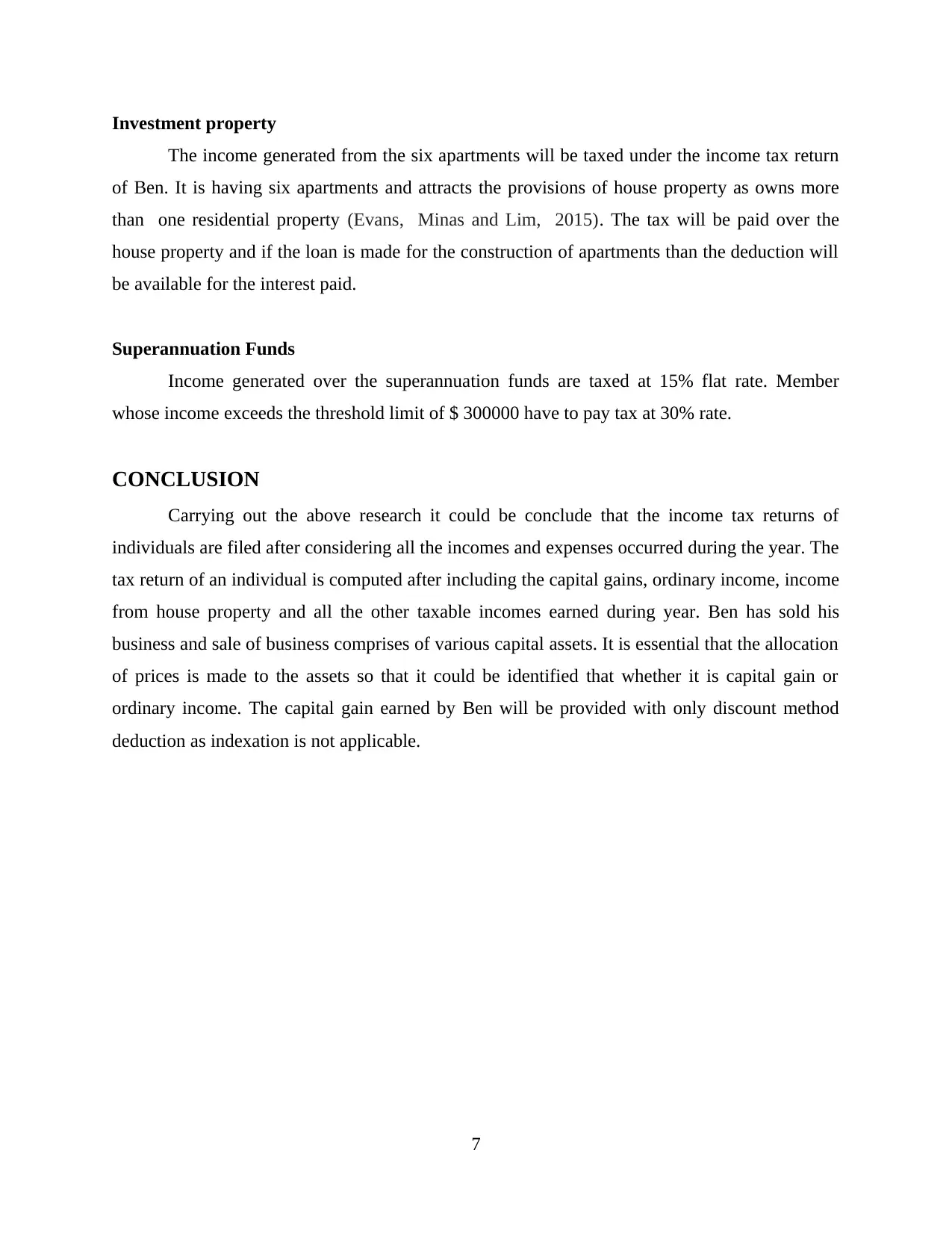
Investment property
The income generated from the six apartments will be taxed under the income tax return
of Ben. It is having six apartments and attracts the provisions of house property as owns more
than one residential property (Evans, Minas and Lim, 2015). The tax will be paid over the
house property and if the loan is made for the construction of apartments than the deduction will
be available for the interest paid.
Superannuation Funds
Income generated over the superannuation funds are taxed at 15% flat rate. Member
whose income exceeds the threshold limit of $ 300000 have to pay tax at 30% rate.
CONCLUSION
Carrying out the above research it could be conclude that the income tax returns of
individuals are filed after considering all the incomes and expenses occurred during the year. The
tax return of an individual is computed after including the capital gains, ordinary income, income
from house property and all the other taxable incomes earned during year. Ben has sold his
business and sale of business comprises of various capital assets. It is essential that the allocation
of prices is made to the assets so that it could be identified that whether it is capital gain or
ordinary income. The capital gain earned by Ben will be provided with only discount method
deduction as indexation is not applicable.
7
The income generated from the six apartments will be taxed under the income tax return
of Ben. It is having six apartments and attracts the provisions of house property as owns more
than one residential property (Evans, Minas and Lim, 2015). The tax will be paid over the
house property and if the loan is made for the construction of apartments than the deduction will
be available for the interest paid.
Superannuation Funds
Income generated over the superannuation funds are taxed at 15% flat rate. Member
whose income exceeds the threshold limit of $ 300000 have to pay tax at 30% rate.
CONCLUSION
Carrying out the above research it could be conclude that the income tax returns of
individuals are filed after considering all the incomes and expenses occurred during the year. The
tax return of an individual is computed after including the capital gains, ordinary income, income
from house property and all the other taxable incomes earned during year. Ben has sold his
business and sale of business comprises of various capital assets. It is essential that the allocation
of prices is made to the assets so that it could be identified that whether it is capital gain or
ordinary income. The capital gain earned by Ben will be provided with only discount method
deduction as indexation is not applicable.
7
⊘ This is a preview!⊘
Do you want full access?
Subscribe today to unlock all pages.

Trusted by 1+ million students worldwide
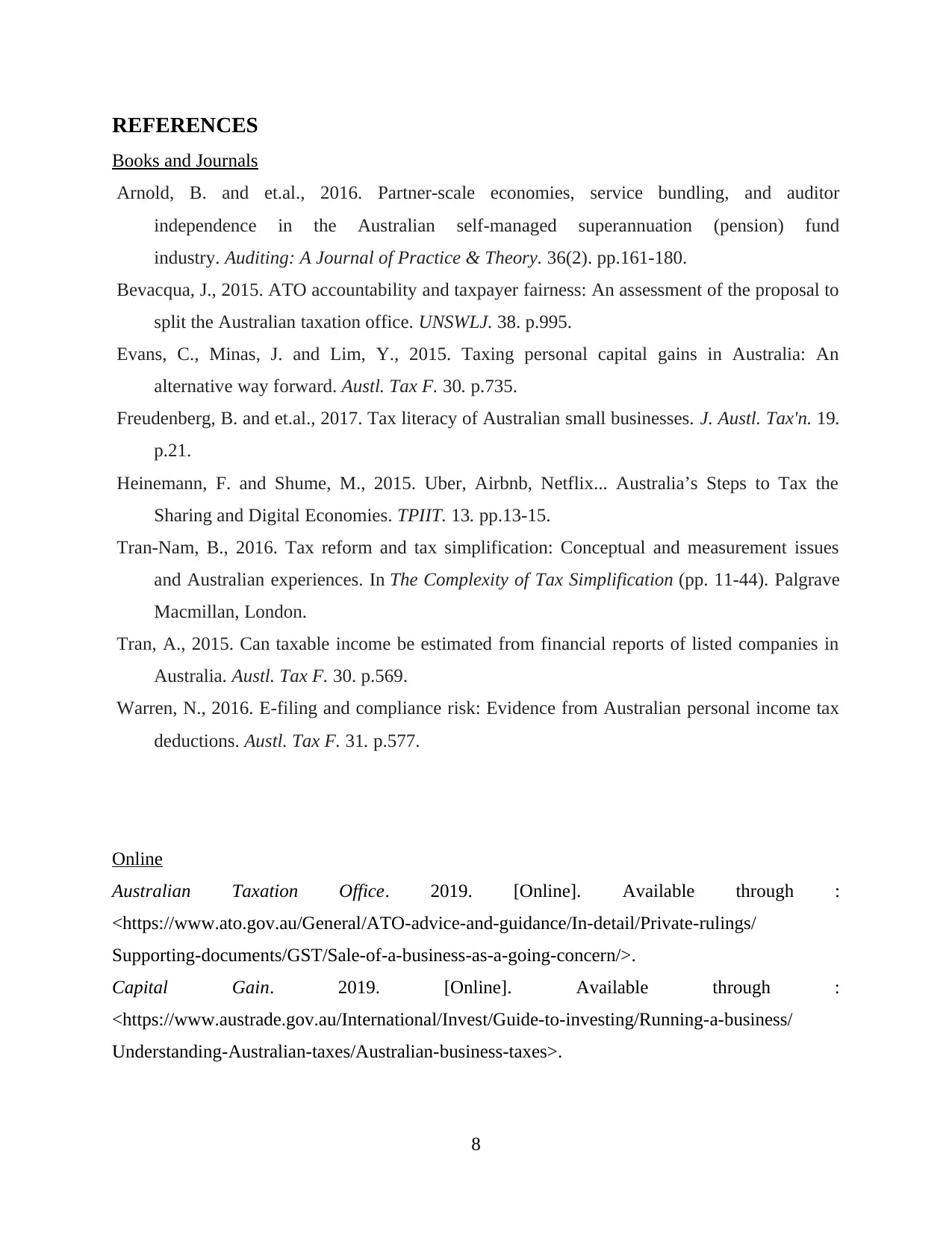
REFERENCES
Books and Journals
Arnold, B. and et.al., 2016. Partner-scale economies, service bundling, and auditor
independence in the Australian self-managed superannuation (pension) fund
industry. Auditing: A Journal of Practice & Theory. 36(2). pp.161-180.
Bevacqua, J., 2015. ATO accountability and taxpayer fairness: An assessment of the proposal to
split the Australian taxation office. UNSWLJ. 38. p.995.
Evans, C., Minas, J. and Lim, Y., 2015. Taxing personal capital gains in Australia: An
alternative way forward. Austl. Tax F. 30. p.735.
Freudenberg, B. and et.al., 2017. Tax literacy of Australian small businesses. J. Austl. Tax'n. 19.
p.21.
Heinemann, F. and Shume, M., 2015. Uber, Airbnb, Netflix... Australia’s Steps to Tax the
Sharing and Digital Economies. TPIIT. 13. pp.13-15.
Tran-Nam, B., 2016. Tax reform and tax simplification: Conceptual and measurement issues
and Australian experiences. In The Complexity of Tax Simplification (pp. 11-44). Palgrave
Macmillan, London.
Tran, A., 2015. Can taxable income be estimated from financial reports of listed companies in
Australia. Austl. Tax F. 30. p.569.
Warren, N., 2016. E-filing and compliance risk: Evidence from Australian personal income tax
deductions. Austl. Tax F. 31. p.577.
Online
Australian Taxation Office. 2019. [Online]. Available through :
<https://www.ato.gov.au/General/ATO-advice-and-guidance/In-detail/Private-rulings/
Supporting-documents/GST/Sale-of-a-business-as-a-going-concern/>.
Capital Gain. 2019. [Online]. Available through :
<https://www.austrade.gov.au/International/Invest/Guide-to-investing/Running-a-business/
Understanding-Australian-taxes/Australian-business-taxes>.
8
Books and Journals
Arnold, B. and et.al., 2016. Partner-scale economies, service bundling, and auditor
independence in the Australian self-managed superannuation (pension) fund
industry. Auditing: A Journal of Practice & Theory. 36(2). pp.161-180.
Bevacqua, J., 2015. ATO accountability and taxpayer fairness: An assessment of the proposal to
split the Australian taxation office. UNSWLJ. 38. p.995.
Evans, C., Minas, J. and Lim, Y., 2015. Taxing personal capital gains in Australia: An
alternative way forward. Austl. Tax F. 30. p.735.
Freudenberg, B. and et.al., 2017. Tax literacy of Australian small businesses. J. Austl. Tax'n. 19.
p.21.
Heinemann, F. and Shume, M., 2015. Uber, Airbnb, Netflix... Australia’s Steps to Tax the
Sharing and Digital Economies. TPIIT. 13. pp.13-15.
Tran-Nam, B., 2016. Tax reform and tax simplification: Conceptual and measurement issues
and Australian experiences. In The Complexity of Tax Simplification (pp. 11-44). Palgrave
Macmillan, London.
Tran, A., 2015. Can taxable income be estimated from financial reports of listed companies in
Australia. Austl. Tax F. 30. p.569.
Warren, N., 2016. E-filing and compliance risk: Evidence from Australian personal income tax
deductions. Austl. Tax F. 31. p.577.
Online
Australian Taxation Office. 2019. [Online]. Available through :
<https://www.ato.gov.au/General/ATO-advice-and-guidance/In-detail/Private-rulings/
Supporting-documents/GST/Sale-of-a-business-as-a-going-concern/>.
Capital Gain. 2019. [Online]. Available through :
<https://www.austrade.gov.au/International/Invest/Guide-to-investing/Running-a-business/
Understanding-Australian-taxes/Australian-business-taxes>.
8
1 out of 10
Related Documents
Your All-in-One AI-Powered Toolkit for Academic Success.
+13062052269
info@desklib.com
Available 24*7 on WhatsApp / Email
![[object Object]](/_next/static/media/star-bottom.7253800d.svg)
Unlock your academic potential
Copyright © 2020–2025 A2Z Services. All Rights Reserved. Developed and managed by ZUCOL.





